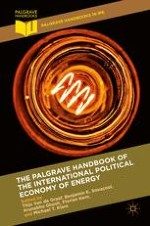2016 | OriginalPaper | Buchkapitel
17. No Blood for Oil? Hydrocarbon Abundance and International Security
verfasst von : Michael T. Klare
Erschienen in: The Palgrave Handbook of the International Political Economy of Energy
Verlag: Palgrave Macmillan UK
Aktivieren Sie unsere intelligente Suche, um passende Fachinhalte oder Patente zu finden.
Wählen Sie Textabschnitte aus um mit Künstlicher Intelligenz passenden Patente zu finden. powered by
Markieren Sie Textabschnitte, um KI-gestützt weitere passende Inhalte zu finden. powered by
